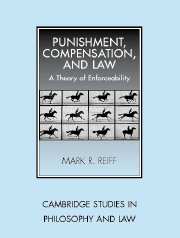Book contents
- Frontmatter
- Contents
- Acknowledgments
- Introduction
- 1 The Means of Enforcement
- 2 The Goals of Enforcement
- 3 Measuring Enforceability in the Previolation State of Affairs
- 4 Measuring Enforceability in the Postviolation State of Affairs
- 5 The Relationship between Previolation Expectations and Postviolation Practice
- 6 Limitations on the Means of Enforcement
- 7 Special Problems with Legal Remedies
- 8 The Value of Nominal Rights
- References
- Index
- Titles in the series
Introduction
Published online by Cambridge University Press: 15 August 2009
- Frontmatter
- Contents
- Acknowledgments
- Introduction
- 1 The Means of Enforcement
- 2 The Goals of Enforcement
- 3 Measuring Enforceability in the Previolation State of Affairs
- 4 Measuring Enforceability in the Postviolation State of Affairs
- 5 The Relationship between Previolation Expectations and Postviolation Practice
- 6 Limitations on the Means of Enforcement
- 7 Special Problems with Legal Remedies
- 8 The Value of Nominal Rights
- References
- Index
- Titles in the series
Summary
Mill said, “All that makes existence valuable to any one, depends on the enforcement of restraints upon the actions of other people.” Two questions are suggested by this remark. First, “what restraints upon the actions of other people should there be?” Second, “how should these restraints be enforced?” Mill characterized the first as “the principal question of human affairs,” and it has indeed been the focus of legal, moral, and political philosophy from long before Mill's remark to the present day. Answering this question requires the development of a method through which the set of appropriate restraints can be identified and derived — a way of deciding which restraints are morally required, which are morally prohibited, and for those restraints that are morally permitted but not required (and there are a great many of these), which should and should not be imposed. Utilitarianism offers one such method, contractarianism another, libertarianism yet another, and there are others still. While some of the restraints identified by the many variants of these theories are similar, many are controversial, and the development and refinement of these theories and the differing methodological approaches they represent continue to occupy a great deal of philosophical attention.
Far less attention, in contrast, has been paid to the second question suggested by Mill's remark, even though it should be obvious that answers to both questions are required if the restraints we impose on members of society are to have much effect on our quality of life, or, to put in more modern terms, if the project of social cooperation is not to founder but to flourish.
- Type
- Chapter
- Information
- Punishment, Compensation, and LawA Theory of Enforceability, pp. 1 - 16Publisher: Cambridge University PressPrint publication year: 2005

